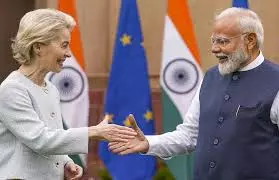US Tariff War: India, EU exploring negotiation of FTA
India has followed the practice of negotiating such trade pacts in two phases with Australia

New Delhi: Amid the US tariff war, India and the European Union (EU) are exploring the option of negotiating their free trade agreement (FTA) in phases in an ‘uncertain global trade environment’ following imposition of sweeping tariffs by the US President Donald Trump. Negotiating the FTA in two phases allows both sides to first conclude areas where agreement can be reached more easily and the complex issues can be dealt with at a later stage, according to an official source.
“After the visit of European Commission President Ursula von der Leyen with the EU College of Commissioners or senior political leaders of the bloc here, the talks are moving in a positive direction and momentum is also building. The free trade deal will be in tranches, which are being explored with the EU. The EU is also learnt to have protested the Us tariff imposed on it,” the source said.
Earlier, India has followed the practice of negotiating such trade pacts in two phases with Australia. “However, the two sides (India and EU) concluded the 10th round of negotiations in Brussels last month for the proposed agreement. The next round of talks is expected in May here,” the source said.
According to trade experts, strengthening economic ties between the two regions is crucial in light of high tariffs imposed by US President Donald Trump on April 3. In June 2022, India and the 27-nation EU bloc resumed the negotiations after a gap of over eight years. It stalled in 2013 due to differences over the level of opening up of the markets.
On February 28, Prime Minister Narendra Modi and the European Commission President agreed to seal a much-awaited free trade deal by this year. The India-EU trade pact negotiations cover 23 policy areas or chapters including trade in goods, services, investment, sanitary and phytosanitary measures, technical barriers to trade, trade remedies, rules of origin, customs and trade facilitation, competition, trade defence and others.
Besides demanding significant duty cuts in automobiles and medical devices, the EU wants tax reduction in wines, spirits and a strong intellectual property regime. Indian goods’ exports to the EU, such as ready-made garments, pharmaceuticals, steel, petroleum products, and electrical machinery, can become more competitive, if the pact gets concluded successfully.
India's bilateral trade in goods with the EU was $137.41 billion in 2023-24 (exports $75.92 billion, imports $61.48 billion), making it the largest trading partner of India for goods. The EU market accounts for about 17 per cent of India's total exports, while the EU's exports to India make up 9 percent of its total exports.
